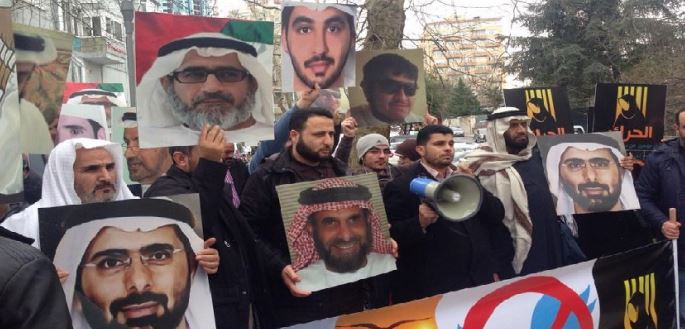In the United Arab Emirates, political parties do not exist, peaceful dissent is not tolerated, and reports regarding arbitrary arrests and the torture of detainees are highly concerning. A country lacking in democratic institutions, the Government of the UAE further imperiled any hope for democracy by continuing its unprecedented crackdown on dissent. The authorities have imposed extensive restrictions regarding the right to freedom of expression and association in the public sphere, and meted out harsh repercussions for individuals courageous enough to criticize these actions or the government itself.
The repercussions faced by dissidents, prominent critics and leading advocates, and protesters en masse have included arbitrary arrests and detentions, enforced disappearances, torture and ill-treatment, unfair trials, and harassment of relatives. Individuals are often held at undisclosed locations, and the authorities refuse to inform families of the whereabouts of their missing relatives. The government claims that it exclusively holds detainees in recognized places of detention and that they routinely allow the detainees to contact their families and legal counsel. Reports, however, suggest that these claims are false: Detainees are denied access to legal counsel, are forcibly disappeared, and are refused contact with their families.
Many government critics and activists have been tried before the biased UAE Federal Supreme Court. Before this court, defendants have no legal basis allowing them to challenge its decisions; this should be viewed as a clear violation of international human rights law. The denial of access to legal counsel is another violation of one’s fair trial rights. Furthermore, although the Constitution of the UAE guarantees freedom of expression “within the limits of the law,” the Penal Code has been worded in such a vague manner that it essentially criminalizes all forms of peaceful dissent.
The authorities of the UAE are resolute in their quest to crush dissent; as such, they allow their state security apparatus to operate essentially unchecked. High numbers of activists have been subjected to a violation of their rights following their dissent, and the UAE authorities routinely violate international law in its treatment of detainees. Specifically, the provisions proscribed in the UN Convention Against Torture (CAT) are ignored: Reports show that many detainees are subjected to torture or other forms of ill-treatment. As required by the CAT, allegations of torture should be examined through a prompt, impartial, independent, and thorough investigation. In practice, however, authorities actively and passively participate in the torture––by conducting the torturous acts themselves, or turning a blind eye to violations of international law. It is this culture of impunity that plays a key role in allowing human rights abuses to occur; a fear of the possibility of being subjected to acts of torture deters people who would otherwise speak critically about the government. This is an essential element in the government’s strategy to stifle peaceful dissent.
The government employs particular tactics to intimidate Emirati dissidents living abroad, as well as relatives who remain in the UAE. Travel bans are imposed on dissidents or their relatives, as has been documented numerous times by Human Rights Watch; often the ban is imposed without informing the affected individual(s). Relatives of dissidents are also hindered when trying to renew important identity documents. More severely, citizenship revocation has been used to punish the dissident or their relatives; recently the citizenship of 19 relatives of two dissidents was revoked. Citizenship revocation brings grave consequences for an individual’s ability to access one’s fundamental human rights, and normally renders an individual stateless.
Additionally, relatives of dissidents can experience restrictions in their ability to access employment opportunities, especially for jobs that require security clearance. In these cases, the Government of the UAE simply fails to approve the clearance necessary for these individuals. Moreover, relatives of dissidents are often barred from entering institutions of higher education. Social exclusion, stemming from fear of association with individuals targeted by the government, is a final element of the environment of intimidation.
The aforementioned harassment and intimidation tactics employed by the authorities constitutes clearly arbitrary and extrajudicial punishment. The United Arab Emirates should immediately overhaul all laws criminalizing the peaceful exercise of the rights to freedom of expression and association. The Government of the UAE must also reevaluate its commitments to international human rights instruments, and uphold the ones to which they are a party. Democratic dialogue can occur only if the government chooses to finally uphold its obligations.





